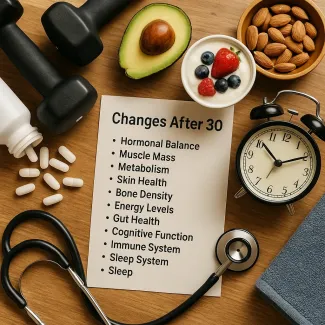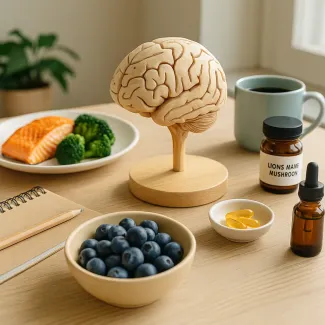
Discover the Essential Body Transformations in Your 30s and Effective Strategies to Stay Healthy
Understanding the physical and mental shifts that come with turning 30
Turning 30 marks a significant milestone, bringing about various physical, hormonal, and mental changes that can influence your overall well-being. While some of these body changes are subtle, others may noticeably affect your energy levels, skin health, metabolism, and more. Recognizing these transformations and learning how to manage them proactively can empower you to lead a vibrant, balanced life.
Hormonal fluctuations: what to expect after 30
As you cross the threshold of your 30s, hormonal shifts begin to play a more prominent role in shaping your health. In both men and women, levels of testosterone, estrogen, and progesterone gradually decline. This can lead to changes in muscle mass, fat distribution, and emotional balance.
Supporting hormone balance naturally
To maintain optimal hormonal health, prioritize a diet rich in healthy fats, fiber, and phytoestrogens (such as those found in flaxseeds and soy). Regular strength training can also help counteract the natural decline in testosterone and support lean muscle mass. Managing stress levels through practices like meditation or yoga can further promote hormonal equilibrium.
Declining muscle mass and strength: a gradual shift
A subtle but impactful change after 30 is the gradual reduction in muscle mass and strength. This process, known as sarcopenia, accelerates with age if left unaddressed.
How to maintain muscle health
Incorporate resistance exercises at least two to three times a week, targeting all major muscle groups. Adequate protein intake—aiming for about 1.2 g per kg of body weight—can further support muscle preservation. Include lean meats, legumes, tofu, and low-fat dairy in your meals.
Slowing metabolism: why it happens and what to do
Many people notice their metabolism begins to slow in their 30s, making weight management more challenging. This is partly due to the natural loss of muscle tissue, which burns more calories at rest compared to fat.
Tips to support a healthy metabolism
Stay active throughout the day—opt for walking, cycling, or taking the stairs whenever possible. Prioritize high-fiber foods such as vegetables, whole grains, and beans, which help regulate blood sugar levels and promote fullness. Staying hydrated is also key, as even mild dehydration can slow metabolic function.
Skin changes: maintaining elasticity and hydration
Your 30s may bring early signs of skin aging, such as fine lines, loss of elasticity, and dullness. These changes occur as collagen production decreases and cell turnover slows.
Enhancing skin health
Protect your skin by applying broad-spectrum sunscreen daily. Incorporate antioxidant-rich foods like berries, citrus fruits, and leafy greens to combat oxidative stress. Using a moisturizer with hyaluronic acid can help maintain hydration levels.
Bone density: laying the foundation for the future
After 30, bone mineral density starts to decline gradually, increasing the risk of osteopenia and osteoporosis in later decades.
Strengthen your bones
Ensure sufficient calcium and vitamin D intake through foods like dairy products, fortified plant-based milks, and fatty fish. Weight-bearing activities such as brisk walking, dancing, or hiking can help maintain bone strength.
Changes in fat distribution: understanding the pattern
You might notice fat accumulation shifting toward the abdominal area in your 30s. This change is driven by both hormonal adjustments and a natural slowing of metabolism.
Strategies for healthy body composition
Focus on core-strengthening exercises and cardiovascular workouts to reduce visceral fat. A diet low in processed sugars and refined carbohydrates can further support a healthy waistline.
Energy levels: combating fatigue in your 30s
Persistent tiredness despite adequate rest is a common complaint among those in their 30s. This can stem from hormonal changes, stress, or poor sleep quality.
Boosting your energy naturally
Prioritize consistent sleep schedules, aiming for 7–9 hours of rest per night. Reduce caffeine intake in the afternoon to support better sleep cycles. Engage in light physical activity during the day, as even a short walk can reinvigorate your mental clarity and physical stamina.
Digestive changes: supporting gut health
Shifts in gut motility and microbiome composition can occur as you age, potentially leading to issues like bloating, constipation, or indigestion.
Tips for a balanced digestive system
Eat a variety of prebiotic and probiotic foods, such as yogurt, kefir, bananas, and asparagus. Chew food thoroughly and eat mindfully to aid digestion. Stay hydrated and engage in regular physical activity to support healthy bowel movements.
Cognitive shifts: staying mentally sharp
In your 30s, subtle changes in memory or concentration may begin to surface, often linked to stress or hormonal fluctuations.
Enhancing cognitive health
Challenge your brain with puzzles, learning new skills, or reading. Ensure your diet includes omega-3 fatty acids, found in salmon, walnuts, and chia seeds, as these support brain function. Managing chronic stress can further enhance mental clarity.
Vision and eye health: adapting to subtle changes
Your eyes may begin to show early signs of strain or fatigue, especially if you spend long hours in front of digital screens.
Supporting eye health
Follow the 20-20-20 rule: every 20 minutes, look at something 20 feet away for 20 seconds. Include vitamin A-rich foods like carrots and sweet potatoes in your diet, and keep your eyes hydrated with artificial tears if needed.
Immune system adjustments: staying resilient
Aging can subtly impact your immune response, making it slightly slower to respond to new threats.
Strengthening immunity
Eat a colorful variety of fruits and vegetables to ensure adequate vitamin C, vitamin E, and zinc intake. Regular physical activity, sufficient sleep, and stress management are vital to keeping your immune system strong.
Sleep patterns: why rest feels different
After 30, some people notice it becomes harder to fall or stay asleep, or they may wake feeling less refreshed.
Promoting restorative sleep
Create a calming bedtime routine that avoids screens at least 30 minutes before bed. Consider using relaxation techniques like deep breathing or guided imagery. Ensure your bedroom environment is cool, dark, and quiet.
Hair health: addressing thinning and texture changes
Hair may gradually become thinner or drier as you enter your 30s. This can be influenced by hormonal shifts, nutrient deficiencies, or styling habits.
Supporting healthy hair
Incorporate foods rich in biotin, iron, and vitamin D, such as eggs, spinach, and almonds. Be gentle with heat styling tools and consider scalp massages to promote circulation.
Cardiovascular health: keeping your heart strong
Your 30s are a critical time to adopt habits that protect your heart health long term. Cholesterol levels and blood pressure can start to rise if neglected.
Simple steps for a healthier heart
Limit intake of saturated fats and added sugars. Choose whole grains, fruits, vegetables, and lean proteins. Include moderate-intensity exercise, such as brisk walking or cycling, for at least 150 minutes weekly.
Oral health: more than just a smile
Gum health can subtly decline after 30, increasing the risk of periodontal disease if not addressed.
Protecting oral health
Brush and floss twice daily, and visit your dentist regularly. A diet low in added sugars can help prevent tooth decay.
Sexual health: navigating normal changes
Shifts in libido or sexual function can occur as part of normal aging processes.
Enhancing intimacy
Communicate openly with partners about needs and concerns. Regular exercise and managing stress can support healthy sexual function.
Joint health: keeping movement smooth
After 30, joint cartilage may begin to wear more noticeably, sometimes leading to stiffness or mild aches.
Caring for your joints
Maintain a healthy body weight to reduce joint stress. Include foods high in omega-3s and antioxidants to help combat inflammation.
Emotional well-being: adapting to life’s new challenges
Your 30s often bring increased responsibilities, which can lead to elevated stress levels or feelings of anxiety.
Nurturing mental health
Prioritize self-care activities that bring joy and relaxation. Seek support networks or consider counseling if needed.
Reproductive health: planning and changes
Fertility begins to gradually decline after 30, particularly in women, but also subtly in men.
Supporting reproductive well-being
If planning for children, consult a healthcare provider early. Maintain a balanced diet, healthy weight, and avoid smoking or excessive alcohol to protect fertility.
The physical, mental, and emotional changes in your 30s are part of a natural process. By adopting supportive habits, you can thrive during this dynamic decade and lay the groundwork for health in the years ahead.





